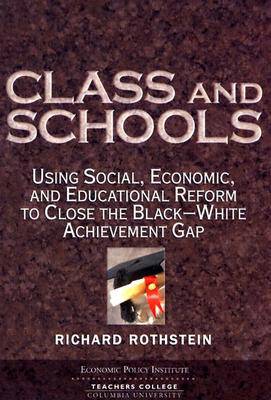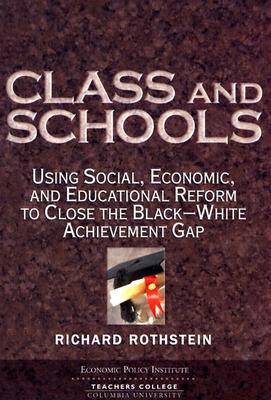
- Retrait gratuit dans votre magasin Club
- 7.000.000 titres dans notre catalogue
- Payer en toute sécurité
- Toujours un magasin près de chez vous
- Retrait gratuit dans votre magasin Club
- 7.000.000 titres dans notre catalogue
- Payer en toute sécurité
- Toujours un magasin près de chez vous
Class and Schools
Using Social, Economic, and Educational Reform to Close the Black-White Achievement Gap
Richard Rothstein
Livre broché | Anglais
32,45 €
+ 64 points
Description
Contemporary public policy assumes that the achievement gap between black and white students could be closed if only schools would do a better job. According to Richard Rothstein, "Closing the gaps between lower-class and middle-class children requires social and economic reform as well as school improvement. Unfortunately, the trend is to shift most of the burden to schools, as if they alone can eradicate poverty and inequality." In this book, Rothstein points the way toward social and economic reforms that would give all children a more equal chance to succeed in school.
Features:
- A summary of numerous studies linking school achievement to health care quality, nutrition, childrearing styles, housing stability, parental economic security, and more.
- A look at erroneous and misleading data that underlie commonplace claims that some schools "beat the demographic odds and therefore any school can close the achievement gap if only it adopted proper practices."
- Analysis of how the over-emphasis on standardized tests in federal law obscures the true achievement gap and makes narrowing it more difficult.
- Description of rarely-noticed racial and socio-economic gaps in "non-cognitive" skills.
- Estimates of the cost of reforms that could help narrow the achievement gap, such as including early childhood, after-school, and summer programs into a broader definition of schooling.
Spécifications
Parties prenantes
- Auteur(s) :
- Editeur:
Contenu
- Nombre de pages :
- 210
- Langue:
- Anglais
Caractéristiques
- EAN:
- 9780807745564
- Date de parution :
- 01-09-04
- Format:
- Livre broché
- Format numérique:
- Trade paperback (VS)
- Dimensions :
- 155 mm x 229 mm
- Poids :
- 312 g







